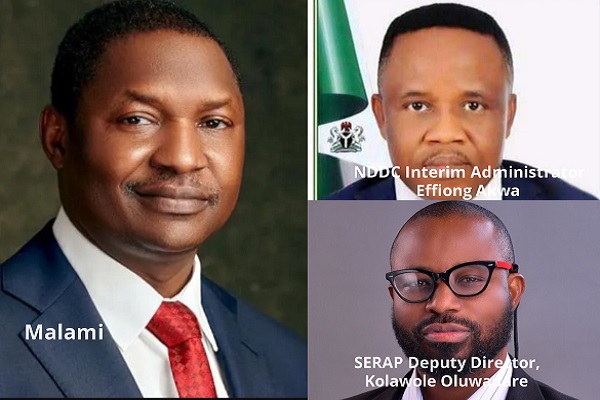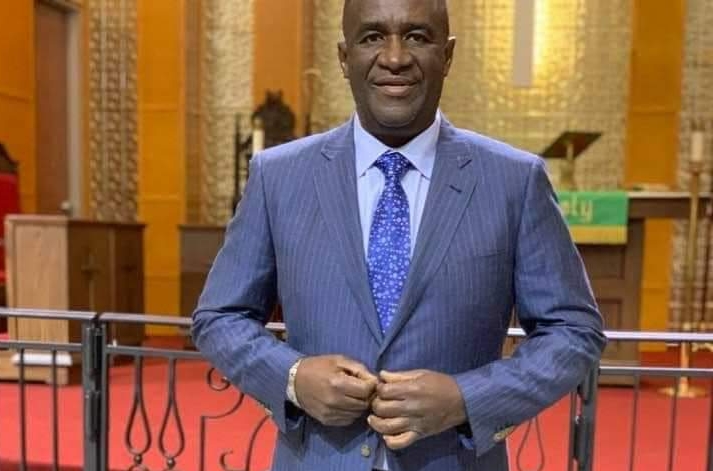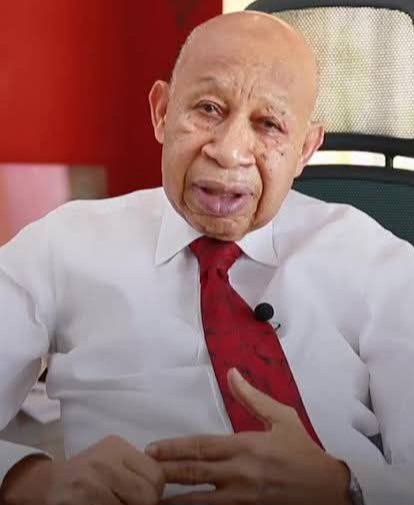SERAP Launches Legal Battle Against Buhari To Name NDDC Looters

The Socio-Economic Rights and Accountability Project (SERAP) has filed a suit at the Federal High Court in Abuja to compel President Muhammadu Buhari to name the looters of the Niger Delta Development Commission (NDDC), reports Deputy News Editor JOSEPH JIBUEZE.
When the forensic audit report on the Niger Delta Development Commission (NDDC) was submitted to President Muhammadu Buhari on September 2, 2021, many hoped that those responsible for looting the agency would finally be named and prosecuted.
The President had ordered a forensic audit of the commission following allegations of gross financial improprieties.
The forensic team comprised 16 field audit firms and a lead forensic auditor, with a mandate to examine 13,777 contracts awarded from 2001 to 2019 at a final contract value of over N6trillion.
President Buhari vowed that all those who mismanaged the funds would be punished.
“Going forward, we shall ensure every recoverable kobo is recovered for use in service of the people of this region and those found culpable shall face the law,” the President said.
Seven months after the report was submitted, no charges has been filed against any NDDC looter or for abandoning a contract after mobilisation, nor have those indicted in the report been named.
A leading civil-society organisation, the Socio-Economic Rights and Accountability Project (SERAP), has, therefore, sued President Buhari “over his failure to publish the names of those indicted in the alleged misappropriation of over N6 trillion in the running of the NDDC”.
In a suit numbered FHC/ABJ/CS/1360/2021 filed at the Federal High Court, Abuja, SERAP is seeking “an order of mandamus to direct and compel President Buhari to publish the names of those indicted in the alleged misappropriation of over N6trillion in the running of the NDDC between 2000 and 2019.”
The suit, which has Attorney-General of the Federation and Minister of Justice Abubakar Malami (SAN) as the second respondent, is before Justice Binta Nyako.
SERAP is also seeking “an order of mandamus to compel President Buhari to direct Malami and appropriate anti-corruption agencies to bring to justice anyone suspected to be responsible for the missing N6trillion, and to fully recover any stolen public funds.”
The group told the court: “It is in the public interest to promptly publish the names of those indicted in the audit report, and to ensure that they face prosecution, as appropriate.
“The public interest in publishing the names of those indicted by the audit report outweighs any considerations to withhold the information, as there would be no prejudice against those whose names are published as long as the information is appropriately framed and truthful.
“The Buhari administration has legal obligations under Section 15(5) of the Constitution 1999 (as amended) to abolish all corrupt practices and abuse of power, and article 26 of the United Nations Convention against Corruption to ensure effective prosecution of allegations of corruption.
“The audit report raises prima facie evidence of grand corruption and its staggering effects in the Niger Delta.
“Nigerians have the right to know the names of those indicted and other details in the report, as guaranteed under the African Charter on Human and Peoples’ Rights and the Freedom of Information Act.”
SERAP is also arguing that publishing the report and the names of those indicted would remove the possibility of obstruction of justice, and provide insights relevant to the public debate on the ongoing efforts to combat grand corruption and the longstanding impunity of perpetrators in the country.
The plaintiff, therefore, seeks “an order of mandamus to direct and compel President Buhari to “widely publish and make available to Nigerians the Forensic Audit Report on the NDDC submitted to him on September 2, 2021.”
SERAP, in the suit filed by its lawyers Kolawole Oluwadare and Opeyemi Owolabi, told the court that Nigeria has made legally binding commitments under the UN Convention against Corruption to ensure transparent management of public resources, and unhindered access to public information.
It added: “These commitments ought to be fully upheld and respected.
“Directing and compelling President Buhari to publish the names of those indicted in the report would advance the victims’ right to restitution, compensation and guarantee of non-repetition, as well as improve public confidence in the fight against corruption.
“Publishing the names of those indicted would be entirely consistent with Nigeria’s constitutional and international anti-corruption commitments.
“Combating the corruption epidemic in the NDDC and reining in those indicted would alleviate poverty, improve access of Nigerians to basic public goods and services, and enhance the ability of the government to meet its human rights and anti-corruption obligations.”
The applicant contends that despite the country’s enormous oil wealth, ordinary Nigerians have derived very little benefit from trillions of naira budgeted for socio-economic development in the Niger Delta.
This, it said, is primarily because of widespread grand corruption and the entrenched culture of impunity of perpetrators.
It added that Nigerians were entitled to the right to receive information without any interference or distortion, and the enjoyment of this right should be based on the principle of maximum disclosure, and a presumption that all information is accessible subject only to a narrow system of exceptions.
SERAP added: “According to public interest test, even if the government demonstrates that the publication of the names of public officials would substantially harm a legitimate interest, it is nevertheless obliged to disclose the requested information if, as it is the case here, the public interest in disclosure is sufficient enough to overweigh any perceived harm.
“The missing N6 trillion and over 13,000 abandoned projects in the Niger Delta have continued to have a negative impact on the human rights of Nigerians, undermining their access to basic public goods and services, such as education, healthcare, and regular and uninterrupted electricity supply.
“Public schools have been left to crumble and wither away, and health care facilities in several parts of the region lack even the most basic of amenities.”
The orders sought
SERAP is praying for an order granting it leave to apply for judicial review to enable it seek an order of mandamus compelling the President to direct the AGF to widely publish the names of those indicted in the forensic report.
It is also praying for an order granting it leave to apply for judicial review to enable it seek an order of mandamus compelling President Buhari to direct Malami and appropriate anti-corruption agencies to promptly bring those indicted to justice.
SERAP, in an affidavit in support, deposed to by its Administrative Officer, Joel Ekong, noted that due to reports of widespread corruption in the NDDC, the President, through the Federal Executive Council, authorised the constitution of a forensic audit team.
The deponent stated: “The forensic audit report on the NDDC is yet to be published or made public. It is a public document.
“In the pursuit of its mandate, and in accordance with the expectations of the respondents as various Nigerian laws and treaty obligations to which Nigeria is a state party, the applicant wrote a letter dated 25th September, 2021 to the first respondent, copying the second respondent, wherein the applicant requested that the first respondent exercise his statutory powers as President to do the following:
“a. To direct the Attorney General of the Federation and Minister of Justice Mr. Abubakar Malami, SAN to widely publish the names of those indicted in the alleged misappropriation of over N6 trillion in the running of the Niger Delta Development Commission (NDDC) between 2000 and 2019, as documented in the recently submitted Forensic Audit Report.
“b. To direct the Attorney General of the Federation and Minister of Justice, Mr. Abubakar Malami, SAN, and appropriate anti-corruption agencies to promptly bring to justice anyone suspected to be responsible for the missing N6 trillion.
“c. To ensure the full recovery of any misappropriated public funds.”
SERAP stated that the letter was duly dispatched to the respondents and was acknowledged as received by them.
“Since the receipt of the letters by the respondents and up till the filing of this suit, the first respondent has so far failed, refused and neglected to take some specific actions which he is obligated under the law to take.
“The first respondent has an obligation to promptly direct the investigation of the allegations of mismanagement, diversion and stealing of public funds contained in the NDDC Forensic Audit and those suspected to be responsible brought to justice in accordance with Nigeria’s anti-corruption legislation.
“This application is seeking leave to enable the applicant apply to the court to compel the first respondent to promptly, thoroughly, transparently and effectively direct the investigation of the allegations of mismanagement, diversion and stealing of public funds contained in the NDDC forensic audit report, and those suspected to be responsible brought to justice.
“This suit is of major public interest as it borders on issue of national interest, public welfare, public interest of human rights, social justice, good governance, transparency and accountability and is in pursuance of the applicant’s mandate as anti-corruption advocate and human rights non-governmental organisation.
“The alleged corruption has hampered the ability of the NDDC as the allegedly looted public funds could have helped the government to invest in key public goods and services and to improve access of Nigerians to these services.
“The Nigeria Government has signed on to the Open Government Partnership (OGP), United Nations Convention on Anti-Corruption (UNCAC), African Union Convention on Preventing and Combating Corruption in Africa and the African Charter on Human and Peoples’ Rights and has even domesticated the African Charter as part of Nigeria’s domestic laws.
“The first respondent did not reply the applicant’s letter nor has he taken any step to investigate the allegations of misappropriation of over N6 trillion in the running of the NDDC between 2000 and 2019, as documented in the recently submitted Forensic Audit Report.
“The interest of the applicant is to promote the ongoing efforts to combat mismanagement of public funds, and to offer the government an important opportunity of being open and transparent with the citizenry.
“I believe that it is in the interest of justice for the Applicant’s reliefs to be granted.”
Applicant’s arguments
SERAP crafted a sole issue for determination: “Whether this Honourable Court ought to grant the leave to enable the Applicant seek judicial review and an order of mandamus, having regard to the law and factual circumstances of this case.”
In its written address, the applicant argued that given the responsibility of the office and high degree of consequences of neglect, the statutory duties of the President are mandatory.
It referred to Section 15[5] of the 1999 Constitution, which provides: “The state shall abolish all corrupt practices and abuse of power”.
SERAP argued that the President’s obligation to direct the investigation of the allegations of mismanagement, diversion and stealing of public funds in the NDDC “is also rooted in the President’s Oath of Office contained in Seventh Schedule of the Constitution of the Federal Republic of Nigeria 1999 (as amended).”
The NGO said the President’s obligation also extends to taking appropriate measures to promote transparency and accountability in the management of public funds.
This, it said, would prevent their mismanagement and the resultant denial of essential public services to citizens .
Besides, the applicant noted that the Chairman of the NDDC Board and members are statutorily appointed by the President in line with Section 2(2)(a)(b) of the NDDC Act.
SERAP added: “The applicant submits that by virtue of the position and power held by the first respondent and the functions that the office imposes, it is his duty and responsibility to ensure that the serious allegations of grave and grievous allegations of corruption, as well as the impunity with which these violations are alleged also to occur, as reported in the NDDC are investigated.
“We contend that that the failure of the first respondent to publish details of the forensic audit report and individuals indicted in the alleged misappropriation of over N6 trillion in the NDDC constitutes a grave violation of the duty placed on the Nigerian government to take appropriate measures to abolish corrupt practices and promote transparency and accountability in the management of public finances.
“This failure to act against corruption may also be construed as tolerance for acts of impunity.
“It is, therefore, in the interest of justice that the court grants this application to protect fundamental rights of Nigerians, and reduce the scope of the incidence of impunity and corruption in Nigeria.”
Why SERAP sued
Before filing the suit, SERAP had written to the President but got no response.
It has urged him to “direct Malami to widely publish the names of those indicted in the alleged misappropriation of over N6 trillion in the running of the NDDC between 2000 and 2019, as documented in the recent Forensic Audit Report on NDDC.”
SERAP also urged him “to direct Mr Malami and appropriate anti-corruption agencies to promptly bring to justice anyone suspected to be responsible for the missing N6 trillion, and to fully recover any misappropriated public funds.”
In the letter dated September 25, 2021 and signed by SERAP’s Deputy Director Kolawole Oluwadare, the organisation said: “It is in the public interest to promptly publish the names of those indicted in the audit report, and to ensure that they face prosecution, as appropriate.
“Taking these decisive steps would advance the victims’ right to restitution, compensation and guarantee of non-repetition, as well as improve public confidence in the fight against corruption.”
The letter was copied to Malami, Independent Corrupt Practices and Other Related Offences Commission (ICPC) Chairman Prof Bolaji Owasanoye (SAN) and Economic and Financial Crimes Commission (EFCC) Chairman Abdulrasheed Bawa.
1. Malami
2. NDDC Interim Administrator Effiong Akwa
3. SERAP Deputy Director, Kolawole Oluwadare







